Reflecting on JC

in·teg·ri·ty (/inˈteɡrədē/), noun: see “39th President of the United States”
As I've been sick for the past week, I haven't consumed as much in the way of news or opinion pieces as I might otherwise have done following the death of Jimmy Carter last Sunday. Regular visitors here will already know that Carter was a personal favorite of mine, and that much of what I have read/heard on the subject these past few days I already knew about. But some bits are worth passing around, so if you'll indulge me in a few President Carter Tribute Links:
- Andy Borowitz breaks from his traditional satire to give a brief note on how the country screwed itself by electing Carter's opponent in 1980.
- Jeff Tiedrich instructs, "in a world of Donald Trumps, be a Jimmy Carter."
- Finally, as always, good ol' Craig Calcaterra has interesting things to say. Craig looked at President Carter's "crisis of confidence" speech from 1979 that is unfairly maligned as "the malaise speech," and said this:
Looking back at it from 2024 it was a speech that, on the merits, was actually pretty wonderful. It was a speech that treated Americans as serious people who could be leveled with. People whose help was needed to face a threat that affected everyone. People in whom, he said, he had confidence to meet the big challenges facing the country even if they were, at that moment, doubtful that anything could be done. It was a speech that, if its ideas were truly embraced, would’ve made this a much different and, in my view, much better America.
Those ideas were not embraced, of course. To the contrary, the ideas behind the Crisis of Confidence speech—acknowledging the country's problems, noting that those problems went deeper than most appreciated, and arguing that they can only be solved with shared sacrifice—were cynically but deftly exploited by Ronald Reagan’s whole “nothing is wrong, Americans don’t have change anything and can continue doing whatever the hell we wanna do forever” vibe. Reagan understood that Americans ... will always believe sweet lies over harsh truths and they will always reject demands of sacrifice if someone gives them a permission structure to do so.
...
I consider America being given the Crisis of Confidence speech specifically and being presented with Jimmy Carter's civic and moral example in general, only to abandon virtually everything about them wholesale, to be the point when Americans turned their backs on what truly made this country great. It was at that point that the country decided that it was not just OK but it was virtuous to be selfish and to reject even the suggestion of sacrifice.
If he had to go—and not only was he 100, he was a decrepit 100 after deciding to forego further treatment for what I presume to have been cancer resurgence (he'd had aggressive melanoma and brain cancers in the past), so he kind of did have to go—I'm glad it was before the change in administration. I can't imagine the 45/47 crew giving Jimmy anything close to the level of respect he's due, whereas President Biden is doing it right. (I'll be pleasantly surprised if Biden's decree of 30 days of flags flying at half-mast actually makes it the full 30 days since the bad guys take over in just 20.)
Jimmy didn't always get things right, but he did always give things thought. He wasn't often persuasive, but he was always honest. Craig is right when he says the election of Reagan in 1980 was the turning point—so very, very many of our society's problems can be traced back to the Reagan Administration—and I've often thought that 1980 was far more critical to history's trajectory than any year since.
Jimmy Carter could have faded into the background after losing his bid for reelection to someone who embodied so much of what he warned Americans against, and in the early months of 1981 he was quite despondent. But before long he rallied himself and instead went about affecting change with his post-presidency on the side of good whenever he found a way to do so. With Trump 2.0 just three weeks away, we all need to emulate that—the country lost its mind and elected devilish fiends, but after we lick our wounds some we can still champion the world's better angels.



Comments
No comments yet.
Add your comment
RSS feed for comments on this post | RSS feed for all comments